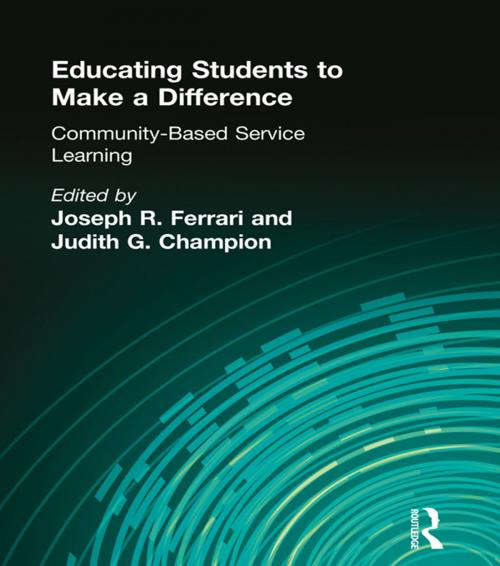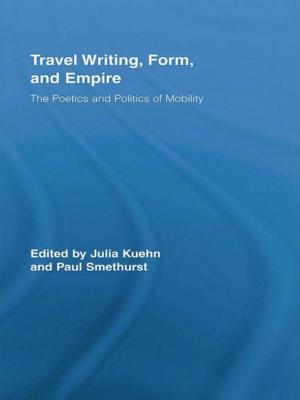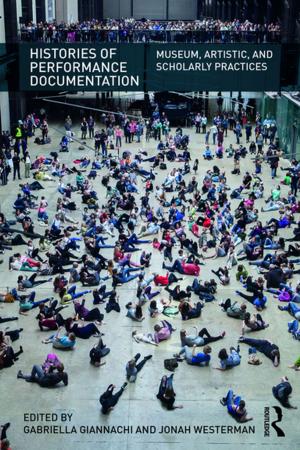Educating Students to Make a Difference
Community-Based Service Learning
Nonfiction, Reference & Language, Education & Teaching| Author: | Joseph R Ferrari, Judith G Chapman | ISBN: | 9781317844570 |
| Publisher: | Taylor and Francis | Publication: | March 18, 2014 |
| Imprint: | Routledge | Language: | English |
| Author: | Joseph R Ferrari, Judith G Chapman |
| ISBN: | 9781317844570 |
| Publisher: | Taylor and Francis |
| Publication: | March 18, 2014 |
| Imprint: | Routledge |
| Language: | English |
Educating Students to Make-a-Difference covers a range of issues related to service learning, addressing the “who,” “why,” and “so what” of service-learning experiences. It provides information that will aid in the development of service-learning programs and courses.
The in-depth studies on student volunteerism found in this book will show you how incorporating student service objectives into your curriculum can improve your students’self-esteem and school involvement, as well as alleviate depression and problem behavior. Educating Students to Make-a- Difference will enhance your knowledge and understanding of volunteerism and its many benefits, showing you how to ignite the volunteer in each of your students. By encouraging volunteerism, you’ll increase your students’problem-solving and leadership skills, as well as their awareness of social issues, and see the positive impact service learning has on students, faculty and the community.
Educating Students to Make-a-Difference gives qualitative and quantitative assessments of attributes that predict volunteerism in student populations and the social values that are developed or enhanced as a consequence of service-learning experiences. You’ll learn about student predispositions and motivations for community service across a variety of student populations. In addition to promoting moral and social values, service-learning opportunities present educational benefits as well as benefits to personal and professional growth. You will see this as the book explores:
- the “who”, “why”, and “so what” of service learning
- educational benefits of service-learning opportunities
- self-esteem and self-efficacy
- faculty benefits
- comparisons between volunteers and nonvolunteers
- motivations and predispositions for student volunteerism
- selection and retention of student volunteers
Your colleagues will want to borrow your syllabus after seeing the results of your new community service incorporated class material. Educating Students to Make-a-Difference gives you the insight on student patterns and volunteerism and data to service learning activities that enhance your students’educational experiences.
Educating Students to Make-a-Difference covers a range of issues related to service learning, addressing the “who,” “why,” and “so what” of service-learning experiences. It provides information that will aid in the development of service-learning programs and courses.
The in-depth studies on student volunteerism found in this book will show you how incorporating student service objectives into your curriculum can improve your students’self-esteem and school involvement, as well as alleviate depression and problem behavior. Educating Students to Make-a- Difference will enhance your knowledge and understanding of volunteerism and its many benefits, showing you how to ignite the volunteer in each of your students. By encouraging volunteerism, you’ll increase your students’problem-solving and leadership skills, as well as their awareness of social issues, and see the positive impact service learning has on students, faculty and the community.
Educating Students to Make-a-Difference gives qualitative and quantitative assessments of attributes that predict volunteerism in student populations and the social values that are developed or enhanced as a consequence of service-learning experiences. You’ll learn about student predispositions and motivations for community service across a variety of student populations. In addition to promoting moral and social values, service-learning opportunities present educational benefits as well as benefits to personal and professional growth. You will see this as the book explores:
- the “who”, “why”, and “so what” of service learning
- educational benefits of service-learning opportunities
- self-esteem and self-efficacy
- faculty benefits
- comparisons between volunteers and nonvolunteers
- motivations and predispositions for student volunteerism
- selection and retention of student volunteers
Your colleagues will want to borrow your syllabus after seeing the results of your new community service incorporated class material. Educating Students to Make-a-Difference gives you the insight on student patterns and volunteerism and data to service learning activities that enhance your students’educational experiences.















